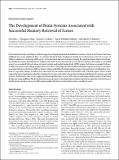| dc.contributor.author | Ofen, Noa | |
| dc.contributor.author | Chai, Xiaoqian | |
| dc.contributor.author | Schuil, Karen D. I. | |
| dc.contributor.author | Whitfield-Gabrieli, Susan | |
| dc.contributor.author | Gabrieli, John D. E. | |
| dc.date.accessioned | 2013-02-05T20:26:12Z | |
| dc.date.available | 2013-02-05T20:26:12Z | |
| dc.date.issued | 2012-07 | |
| dc.date.submitted | 2012-05 | |
| dc.identifier.issn | 0270-6474 | |
| dc.identifier.issn | 1529-2401 | |
| dc.identifier.uri | http://hdl.handle.net/1721.1/76734 | |
| dc.description.abstract | Neuroanatomical and psychological evidence suggests prolonged maturation of declarative memory systems in the human brain from childhood into young adulthood. Here, we examine functional brain development during successful memory retrieval of scenes in children, adolescents, and young adults ages 8–21 via functional magnetic resonance imaging. Recognition memory improved with age, specifically for accurate identification of studied scenes (hits). Successful retrieval (correct old–new decisions for studied vs unstudied scenes) was associated with activations in frontal, parietal, and medial temporal lobe (MTL) regions. Activations associated with successful retrieval increased with age in left parietal cortex (BA7), bilateral prefrontal, and bilateral caudate regions. In contrast, activations associated with successful retrieval did not change with age in the MTL. Psychophysiological interaction analysis revealed that there were, however, age-relate changes in differential connectivity for successful retrieval between MTL and prefrontal regions. These results suggest that neocortical regions related to attentional or strategic control show the greatest developmental changes for memory retrieval of scenes. Furthermore, these results suggest that functional interactions between MTL and prefrontal regions during memory retrieval also develop into young adulthood. The developmental increase of memory-related activations in frontal and parietal regions for retrieval of scenes and the absence of such an increase in MTL regions parallels what has been observed for memory encoding of scenes. | en_US |
| dc.description.sponsorship | National Institutes of Health (U.S.) (Grant RO1-MH-080344) | en_US |
| dc.language.iso | en_US | |
| dc.publisher | Society for Neuroscience | en_US |
| dc.relation.isversionof | http://dx.doi.org/10.1523/jneurosci.1082-11.2012 | en_US |
| dc.rights | Article is made available in accordance with the publisher's policy and may be subject to US copyright law. Please refer to the publisher's site for terms of use. | en_US |
| dc.source | SFN | en_US |
| dc.title | The Development of Brain Systems Associated with Successful Memory Retrieval of Scenes | en_US |
| dc.type | Article | en_US |
| dc.identifier.citation | Ofen, N. et al. “The Development of Brain Systems Associated with Successful Memory Retrieval of Scenes.” Journal of Neuroscience 32.29 (2012): 10012–10020. | en_US |
| dc.contributor.department | Harvard University--MIT Division of Health Sciences and Technology | en_US |
| dc.contributor.department | Massachusetts Institute of Technology. Department of Brain and Cognitive Sciences | en_US |
| dc.contributor.department | McGovern Institute for Brain Research at MIT | en_US |
| dc.contributor.mitauthor | Ofen, Noa | |
| dc.contributor.mitauthor | Chai, Xiaoqian | |
| dc.contributor.mitauthor | Schuil, Karen D. I. | |
| dc.contributor.mitauthor | Whitfield-Gabrieli, Susan | |
| dc.contributor.mitauthor | Gabrieli, John D. E. | |
| dc.relation.journal | Journal of Neuroscience | en_US |
| dc.eprint.version | Final published version | en_US |
| dc.type.uri | http://purl.org/eprint/type/JournalArticle | en_US |
| eprint.status | http://purl.org/eprint/status/PeerReviewed | en_US |
| dspace.orderedauthors | Ofen, N.; Chai, X. J.; Schuil, K. D. I.; Whitfield-Gabrieli, S.; Gabrieli, J. D. E. | en |
| dc.identifier.orcid | https://orcid.org/0000-0001-5966-2242 | |
| dc.identifier.orcid | https://orcid.org/0000-0003-1158-5692 | |
| dc.identifier.orcid | https://orcid.org/0000-0002-5946-1069 | |
| mit.license | PUBLISHER_POLICY | en_US |
| mit.metadata.status | Complete | |
